
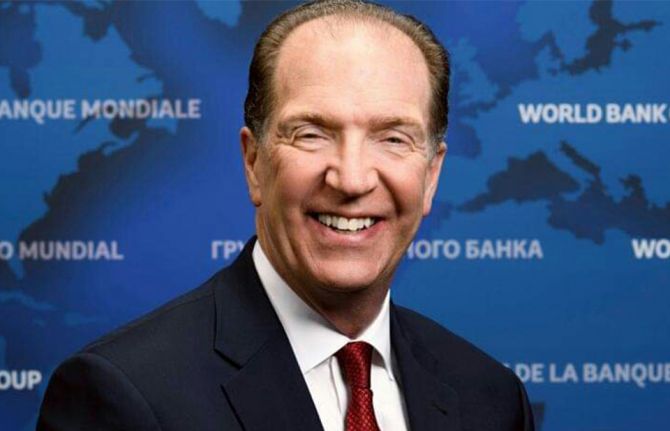
Press Statement
UNAIDS welcomes appointment of David Malpass as the new President of the World Bank
08 April 2019 08 April 2019GENEVA, 8 April 2019—UNAIDS welcomes the announcement that David Malpass will be the new President of the World Bank, beginning his five-year term on Tuesday, 9 April 2019.
“UNAIDS’ work with the World Bank to address the interrelated challenges of HIV, inequality and extreme poverty is critical,” said Michel Sidibé, Executive Director of UNAIDS. “I warmly welcome the appointment of David Malpass as the new President of the World Bank and look forward to a continued close collaboration towards ending AIDS as a public health threat, increasing economic opportunities and building shared prosperity.”
The World Bank is one of UNAIDS’ 11 Cosponsors and helps countries to provide HIV prevention, care and treatment services by offering financing, specialized technical support and knowledge. The World Bank is the lead agency for support to strategic planning, including costed and prioritized multisectoral national AIDS plans and analysis to underpin evidence-informed policies.
UNAIDS looks forward to continuing to work closely with the World Bank and with Mr Malpass in his new role as President.
UNAIDS
The Joint United Nations Programme on HIV/AIDS (UNAIDS) leads and inspires the world to achieve its shared vision of zero new HIV infections, zero discrimination and zero AIDS-related deaths. UNAIDS unites the efforts of 11 UN organizations—UNHCR, UNICEF, WFP, UNDP, UNFPA, UNODC, UN Women, ILO, UNESCO, WHO and the World Bank—and works closely with global and national partners towards ending the AIDS epidemic by 2030 as part of the Sustainable Development Goals. Learn more at unaids.org and connect with us on Facebook, Twitter, Instagram and YouTube.
Press centre
Download the printable version (PDF)

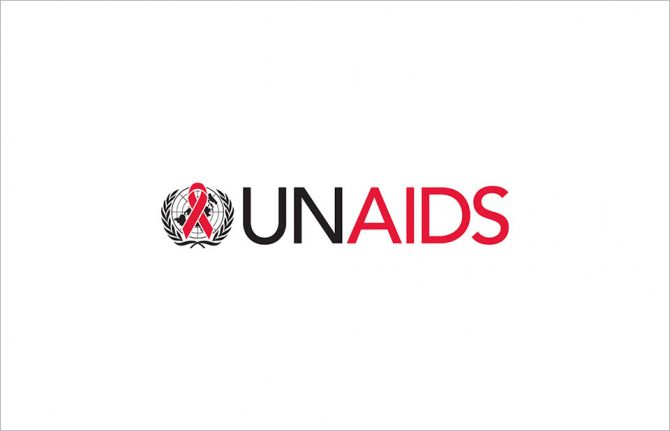
Press Statement
UNAIDS and the United Nations Population Fund urge the Government of Brunei Darussalam to repeal new discriminatory and harmful criminal law provisions
04 April 2019 04 April 2019GENEVA, 4 April 2019—UNAIDS and UNFPA, the United Nations sexual and reproductive health agency, are seriously concerned by new criminal law provisions that came into force yesterday, 3 April 2019, in Brunei Darussalam. The provisions, which impose the death penalty for same-sex sexual activity, adultery and for having a child outside of marriage, breach a number of international human rights norms, including the right to be free from torture and from cruel, inhumane or degrading treatment. The provisions will have a significant negative impact on overall health and well-being.
“These extreme and unjustified punishments will drive people underground and out of reach of life-saving HIV treatment and prevention services,” said Michel Sidibé, Executive Director of UNAIDS. “I strongly urge Brunei Darussalam to suspend or repeal the amendments to the Syariah Penal Code and I offer UNAIDS’ support to ensure that laws are grounded in human rights, based on evidence and protect the most vulnerable.”
Laws that punish sexual orientation, same sex relations and reproductive health care are discriminatory, and have a disproportionate impact on women, creating barriers to accessing health information and services, which in turn increases vulnerability to HIV and other health concerns. Impeding access to sexual and reproductive health and rights, including HIV services, negatively affects public health.
“Every person, without any distinction on any grounds, has an equal right to live free from violence, persecution, discrimination and stigma of any kind. Human rights are universal. Cultural, religious and moral practices and beliefs, and social attitudes must not be invoked to justify human rights violations against any group regardless of gender or sexual orientation,” stated Natalia Kanem, Executive Director of UNFPA.
Criminalization of same-sex sexual conduct has been shown to increase stigma and give license to discrimination, violence and harassment. Evidence shows that where communities are criminalized, they are more vulnerable to violence, less likely to access necessary HIV and other health services, and less able to protect themselves against HIV infection. Criminalizing people also works against reaching the Sustainable Development Goals agreed by the United Nations General Assembly.
UNAIDS and UNFPA are concerned by increasing conservative and discriminatory policies and rhetoric in a number of countries, which may potentially give rise to violence, stigma and discrimination against people on the basis of gender, gender identity and sexual orientation. Recent discussions with governments in the Asia–Pacific region and beyond have highlighted the need to put evidence-informed and human rights-based laws and policies in place.
Last December, Brunei Darussalam called for more and better data on its key affected and higher-risk populations in order to ensure more effective outreach. The production of those data, which would help improve Brunei Darussalam’s health-care provisions for key affected and higher-risk populations, will be undermined by the Syariah Penal Code.
UNAIDS and UNFPA support the calls of the United Nations High Commissioner for Human Rights and the open letter of the five United Nations human rights mandate holders to suspend the implementation of the revised penal code and urge all governments to protect the human rights of all people. This includes repealing criminal laws against adult consensual sexual conduct and decisions on reproduction, implementing laws to protect all people from violence and discrimination and ensuring that adequate health services, including sexual and reproductive health services, are accessible, affordable and acceptable to address their needs.
UNAIDS
The Joint United Nations Programme on HIV/AIDS (UNAIDS) leads and inspires the world to achieve its shared vision of zero new HIV infections, zero discrimination and zero AIDS-related deaths. UNAIDS unites the efforts of 11 UN organizations—UNHCR, UNICEF, WFP, UNDP, UNFPA, UNODC, UN Women, ILO, UNESCO, WHO and the World Bank—and works closely with global and national partners towards ending the AIDS epidemic by 2030 as part of the Sustainable Development Goals. Learn more at unaids.org and connect with us on Facebook, Twitter, Instagram and YouTube.
UNFPA
UNFPA is the United Nations sexual and reproductive health agency. Our mission is to deliver a world where every pregnancy is wanted, every childbirth is safe and every young person's potential is fulfilled. Learn more at www.unfpa.org.
Contact
UNAIDSMichael Hollingdale
tel. +41 22 791 5534 / +4179 500 2119
hollingdalem@unaids.org
UNAIDS
Media
tel. +41 22 791 42 37
communications@unaids.org
UNFPA
Omar Gharzeddine
tel. +1 212-297-5028
gharzeddine@unfpa.org
Press centre
Download the printable version (PDF)
Region/country


Press Statement
UNAIDS welcomes large-scale HIV prevention trial results showing a 30% decline in the rate of new HIV infections
06 March 2019 06 March 2019SEATTLE/GENEVA, 6 March 2019—UNAIDS welcomes the results from the HPTN 071 (PopART) trial. The results showed a 30% decline in new HIV infections where HIV prevention, including home-based HIV counselling and testing, was provided, as well as referral to HIV care and treatment for people testing positive for HIV according to country guidelines. The study took place between 2013 and 2018 and included 21 urban communities in Zambia and South Africa, covering a total population of 1 million people, the largest study of its kind.
“UNAIDS congratulates the PopART team on this important study, which clearly demonstrates the critical impact of community-based HIV prevention, testing and linkage to treatment,” said Michel Sidibé, Executive Director of UNAIDS. “It reinforces UNAIDS’ call for more community health-care workers across Africa, the need for increased investment in HIV prevention and treatment, including new and better tools and systems to deliver them. It also shows the urgent need to reach men and young people.”
There were three arms in the study. Arms A and B delivered the PopART package of HIV prevention, which includes annual household-based HIV counselling and testing, linkage to care at the local health centre for people living with HIV, follow-up visits to people living with HIV to ensure that they were linked to care and to support adherence to treatment, promotion of voluntary medical male circumcision for men who tested HIV-negative, services to prevent mother-to-child transmission of HIV, referral for treatment of sexually transmitted infections, provisions of condoms in the community and screening and referral for tuberculosis.
Arm A offered immediate initiation of antiretroviral therapy to people testing positive for HIV irrespective of CD4 count. Arm B offered antiretroviral therapy only to people who were eligible in accordance with the country guidelines—this was a CD4 count of 350 at the beginning of the trial, which moved to 500 and in 2016 treatment was offered to all people living with HIV, as in arm A. Arm C had no household intervention, but people did have access to HIV testing and treatment services in accordance with the country guidelines.
Both arms A and B reached the 90–90–90* targets overall. In arm B, HIV incidence declined by 30% compared to the basic standard of care offered by the countries involved in the study. In arm A incidence declined by just 7%, which, although not statistically significant, is surprising; ongoing transmission was also at a considerable rate (1.5%) in arm A. Further analysis is under way to help explain why the decline in incidence was not higher in arm A despite high viral suppression (viral suppression was 72% in arm A, 68% in arm B and 60% in arm C).
Subgroup analysis also showed that in both arm A and arm B antiretroviral therapy coverage was high in women older than 25 years and in men older than 40 years, but men and younger people had a much lower coverage. It also showed that men and younger people were much less likely to be virally suppressed. This emphasizes the importance of ensuring that 90–90–90 is reached at the country level but also that each population group reaches 90–90–90.
The impact of community-based access to testing, treatment and primary prevention in the trial is evident and supports UNAIDS’ focus on strengthening community platforms. UNAIDS promotes this work through the 90–90–90 initiative, the Fast-Track cities initiative and the Global HIV Prevention Coalition, a coalition convened by UNAIDS and the United Nations Population Fund to accelerate access to combination HIV prevention in settings with high HIV incidence. The work of the coalition includes a particular focus on young women and their male partners—groups that were found to require better access to services in the PopART trial.
UNAIDS underscores that there is still no single HIV prevention method that is fully protective against HIV. To end the AIDS epidemic, UNAIDS strongly recommends a combination of HIV prevention options. These include ensuring that all people living with HIV have immediate access to antiretroviral therapy, the correct and consistent use of male or female condoms, starting having sex at an older age, having fewer partners, voluntary medical male circumcision, and the use of pre-exposure prophylaxis for people at higher risk of HIV infection.
The results of the PopART trial were presented at the Conference on Retroviruses and Opportunistic Infections, taking place in Seattle, United States of America from 4-7 March 2019.
* By 2020, 90% of people living with HIV know their HIV status, 90% of people who know their HIV-positive status are accessing treatment and 90% of people on treatment have suppressed viral loads.
UNAIDS
The Joint United Nations Programme on HIV/AIDS (UNAIDS) leads and inspires the world to achieve its shared vision of zero new HIV infections, zero discrimination and zero AIDS-related deaths. UNAIDS unites the efforts of 11 UN organizations—UNHCR, UNICEF, WFP, UNDP, UNFPA, UNODC, UN Women, ILO, UNESCO, WHO and the World Bank—and works closely with global and national partners towards ending the AIDS epidemic by 2030 as part of the Sustainable Development Goals. Learn more at unaids.org and connect with us on Facebook, Twitter, Instagram and YouTube.
Press centre
Download the printable version (PDF)

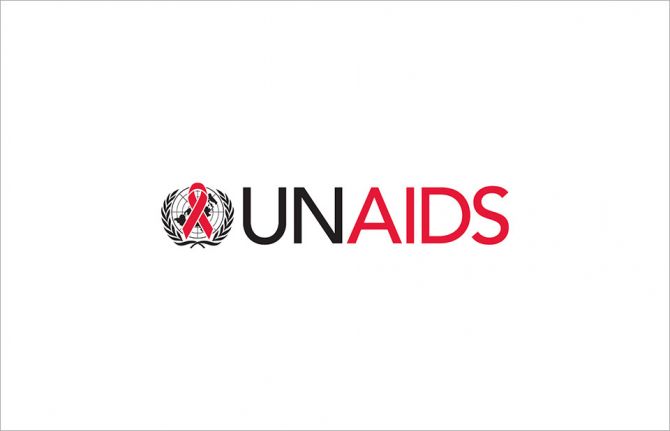
Press Statement
UNAIDS is greatly encouraged by news of a possible cure of an HIV-positive man
05 March 2019 05 March 2019SEATTLE/GENEVA, 5 March 2019—UNAIDS is greatly encouraged by the news that an HIV-positive man has been functionally cured of HIV. The man was treated by specialists at University College London and Imperial College London for advanced Hodgkin’s lymphoma in 2016 using stem cell transplants from a donor who carried a rare genetic mutation. Researchers report that HIV has been undetectable in the man since he stopped taking antiretroviral medicine 18 months ago.
“To find a cure for HIV is the ultimate dream,” said Michel Sidibé, Executive Director of UNAIDS. “Although this breakthrough is complicated and much more work is needed, it gives us great hope for the future that we could potentially end AIDS with science, through a vaccine or a cure. However, it also shows how far away we are from that point and of the absolute importance of continuing to focus HIV prevention and treatment efforts.”
Stem cell transplants are highly complex, intensive and costly procedures with substantial side-effects and are not a viable way of treating large numbers of people living with HIV. However, the results do offer a greater insight for researchers working on HIV cure strategies and highlight the continuing importance of investing in scientific research and innovation.
The result, reported at the Conference on Retroviruses and Opportunistic Infections in Seattle, United States of America, is one of only two cases of reported functional cures for HIV. The first was the case of the Berlin patient, Timothy Ray Brown, who received similar treatment for cancer in 2007.
There is currently no cure for HIV. UNAIDS is working to ensure that all people living with and affected by HIV have access to life-saving HIV prevention, treatment, care and support services. In 2017, there were 36.9 million people living with HIV and 1.8 million people became newly infected with the virus. In the same year, almost 1 million people died of AIDS-related illnesses and 21.7 million people had access to treatment.
UNAIDS
The Joint United Nations Programme on HIV/AIDS (UNAIDS) leads and inspires the world to achieve its shared vision of zero new HIV infections, zero discrimination and zero AIDS-related deaths. UNAIDS unites the efforts of 11 UN organizations—UNHCR, UNICEF, WFP, UNDP, UNFPA, UNODC, UN Women, ILO, UNESCO, WHO and the World Bank—and works closely with global and national partners towards ending the AIDS epidemic by 2030 as part of the Sustainable Development Goals. Learn more at unaids.org and connect with us on Facebook, Twitter, Instagram and YouTube.
Press centre
Download the printable version (PDF)

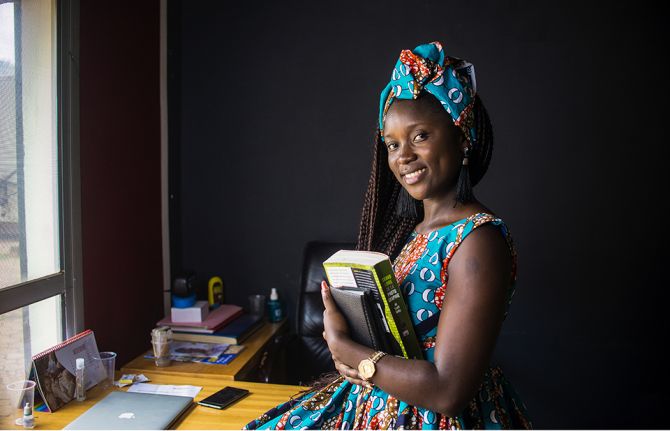
Press Statement
On International Women’s Day, UNAIDS calls for greater action to protect young women and adolescent girls
08 March 2019 08 March 2019Every day, 460 adolescent girls become infected with HIV and every week 350 adolescent girls die of AIDS-related illnesses
GENEVA, 8 March 2019—On International Women’s Day, UNAIDS is urging countries to step up and protect young women and adolescent girls from HIV.
AIDS-related illnesses remain the leading cause of death for women aged 15–49 years globally. In 2017, 66% of new HIV infections among 10–19-year-olds were among females globally—in eastern and southern Africa, 79% of new HIV infections among 10–19-year-olds were among females.
“There is a vicious cycle of gender inequities, gender-based violence and HIV infection in many parts of the world,” said Michel Sidibé, Executive Director of UNAIDS. “Oppression and power imbalances must be redressed and harmful masculinities addressed in order to ensure that women and girls have full control over their sexual health and rights.”
Much more needs to be done to reach young people with HIV prevention, treatment and care. Young women and adolescent girls are especially being left behind. Gender-based violence, sexual exploitation and drug use are among the many factors that can increase the vulnerability of young women and adolescent girls to HIV.
Efforts to end AIDS are undermined where the human rights of young women and adolescent girls—especially their sexual and reproductive health and rights—are not supported. Countries must therefore enact laws and policies that enable access to services, including health and social protection, by young women and adolescent girls, helping them to claim their right to health.
International law gives people, including young women and adolescent girls, the right to access services to protect their sexual and reproductive health. However, 45 countries worldwide still have laws that require people under the age of 18 years to obtain the consent of their parents in order to be tested for HIV.
Social protection, education—including comprehensive sexuality education—and HIV prevention services that are integrated with sexual and reproductive health services have been shown to improve the health of, and empower, young women and adolescent girls. A South African study showed that HIV prevalence among girls who had finished high school was about half that among girls who had not (8.6% versus 16.9%). Children who access universal primary education in Botswana, Malawi and Uganda have been shown to have similar outcomes.
Investing in education. Investing in HIV and other health services. Preventing and protecting women and girls from violence. Eradicating harmful practices such as early, forced and child marriage. Promoting women’s rights. Through these actions young women and adolescent girls can be protected from HIV and the world can build towards ending AIDS by 2030.
UNAIDS
The Joint United Nations Programme on HIV/AIDS (UNAIDS) leads and inspires the world to achieve its shared vision of zero new HIV infections, zero discrimination and zero AIDS-related deaths. UNAIDS unites the efforts of 11 UN organizations—UNHCR, UNICEF, WFP, UNDP, UNFPA, UNODC, UN Women, ILO, UNESCO, WHO and the World Bank—and works closely with global and national partners towards ending the AIDS epidemic by 2030 as part of the Sustainable Development Goals. Learn more at unaids.org and connect with us on Facebook, Twitter, Instagram and YouTube.
Contact
UNAIDS GenevaAnne-Claire Guichard
tel. +41 22 791 2321
guicharda@unaids.org
UNAIDS Media
tel. +41 22 791 42 37
communications@unaids.org
Press centre
Download the printable version (PDF)

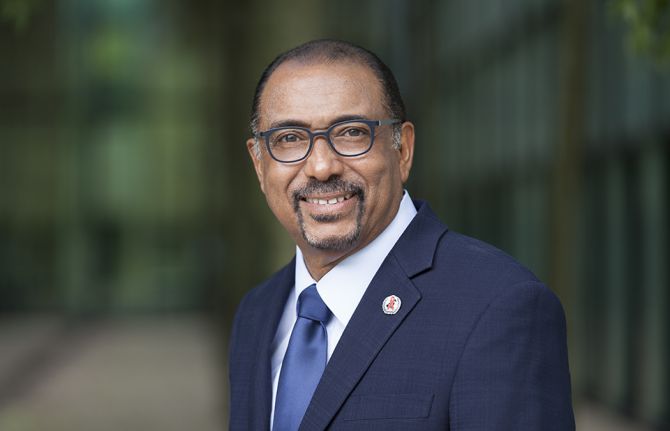
Press Statement
Message from the UNAIDS Executive Director on Zero Discrimination Day
01 March 2019 01 March 2019On 1 March, Zero Discrimination Day, we celebrate the advocacy and activism that brings the world closer to zero discrimination and the actions and laws that help to ensure that people can live with dignity.
My call this year is focused on changing discriminatory laws and practices that block people from accessing health and other life-saving services.
Laws should protect, not reject. Every person has an equal right to be treated with dignity and respect.
In 2019, I call on countries to support the Global Partnership for Action to Eliminate all Forms of HIV-Related Stigma and Discrimination, launched by the Global Network of People Living with HIV, UNAIDS, the United Nations Development Programme, UN Women and the UNAIDS Programme Coordinating Board nongovernmental organization delegation on 10 December 2018, Human Rights Day. Civil society organizations, networks of people living with HIV and key populations are leading with organizations in the United Nations system—the World Food Programme, the United Nations Development Programme, UN WOMEN, the International Labour Organization, the United Nations Educational, Scientific and Cultural Organization and the World Health Organization—to provide guidance to countries working to respond to stigma and discrimination.
The work of the global partnership will focus on six key settings—health-care settings, the workplace, the education system, the justice system, households and humanitarian and emergency settings.
Zero discrimination is essential to achieving universal health coverage and the Sustainable Development Goals. All over the world, people are unable to live with dignity because of laws and practices that discriminate. For example:
- At least 20 countries worldwide still impose travel restrictions on people living with HIV.
- In 29 countries women require the consent of their spouse or partner to access sexual and reproductive health services.
Laws must protect, not cause harm. All countries must carefully review their laws and policies to ensure equality and protection for all people, with no exceptions.
On Zero Discrimination Day, and every day, let’s act together to change discriminatory laws.
Michel Sidibé
Executive Director of UNAIDS
Under-Secretary-General of the United Nations
UNAIDS
The Joint United Nations Programme on HIV/AIDS (UNAIDS) leads and inspires the world to achieve its shared vision of zero new HIV infections, zero discrimination and zero AIDS-related deaths. UNAIDS unites the efforts of 11 UN organizations—UNHCR, UNICEF, WFP, UNDP, UNFPA, UNODC, UN Women, ILO, UNESCO, WHO and the World Bank—and works closely with global and national partners towards ending the AIDS epidemic by 2030 as part of the Sustainable Development Goals. Learn more at unaids.org and connect with us on Facebook, Twitter, Instagram and YouTube.
Contact
UNAIDS GenevaAnne-Claire Guichard
tel. +41 22 791 2321
guicharda@unaids.org
UNAIDS Media
tel. +41 22 791 42 37
communications@unaids.org
Press centre
Download the printable version (PDF)

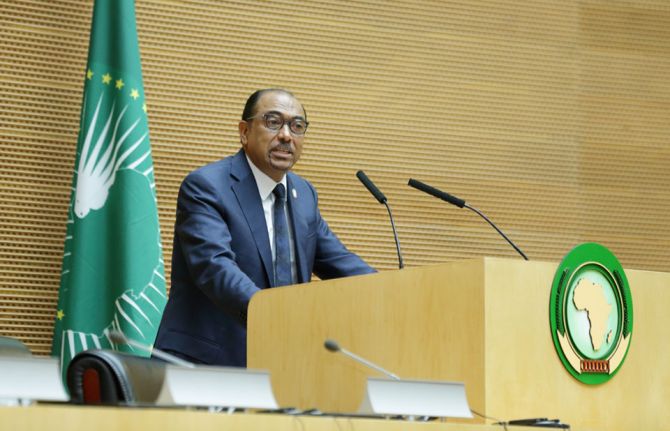
Press Statement
African Union recognizes Executive Director of UNAIDS for his outstanding achievements in tackling AIDS
11 February 2019 11 February 2019ADDIS ABABA/GENEVA, 11 February 2019—The African Union has passed a motion of support for the Executive Director of UNAIDS Michel Sidibé recognizing that the invaluable work of UNAIDS, under the leadership of Mr Sidibé, has saved many lives and has had a decisive impact on the AIDS epidemic in Africa.
The motion was passed during the 32nd Ordinary Session of the African Union Assembly in Addis Ababa, Ethiopia on 11 February 2019. It credits Mr Sidibé’s strategic vision and relentless advocacy to ensure that all populations, including the most vulnerable, have access to health services. It also commends him for keeping HIV among the top global health priorities and for his efforts in improving the health of the people of Africa.
“It is a privilege to serve the people of Africa and the world and I have dedicated my forty-year career to ensuring that vulnerable populations everywhere can live with dignity,” said Mr Sidibé. “The strong partnership between the African Union and UNAIDS is one that has been built on shared responsibility and global solidarity. The global support for the AIDS response and people living with HIV has been unprecedented and we must redouble our efforts to end AIDS. I will continue to do my best to ensure no one is left behind.”
African Union members expressed their profound gratitude for his work and commitment and for his contribution to the attainment of the objectives of the African Union, including Agenda 2063.
The African Union said it remains committed to work with UNAIDS and all its partners to mobilize all the energies and necessary resources to end AIDS as a public health threat by 2030. And “counts on his unflinching commitment and abiding leadership to continue to promote the health and wellbeing of the peoples of the African continent.”
UNAIDS
The Joint United Nations Programme on HIV/AIDS (UNAIDS) leads and inspires the world to achieve its shared vision of zero new HIV infections, zero discrimination and zero AIDS-related deaths. UNAIDS unites the efforts of 11 UN organizations—UNHCR, UNICEF, WFP, UNDP, UNFPA, UNODC, UN Women, ILO, UNESCO, WHO and the World Bank—and works closely with global and national partners towards ending the AIDS epidemic by 2030 as part of the Sustainable Development Goals. Learn more at unaids.org and connect with us on Facebook, Twitter, Instagram and YouTube.
Contact
Sophie Barton-Knotttel. +41 22 791 1697 / +4179 514 6896
bartonknotts@unaids.org
UNAIDS Media
tel. +41 22 791 42 37
communications@unaids.org
Press centre
Download the printable version (PDF)

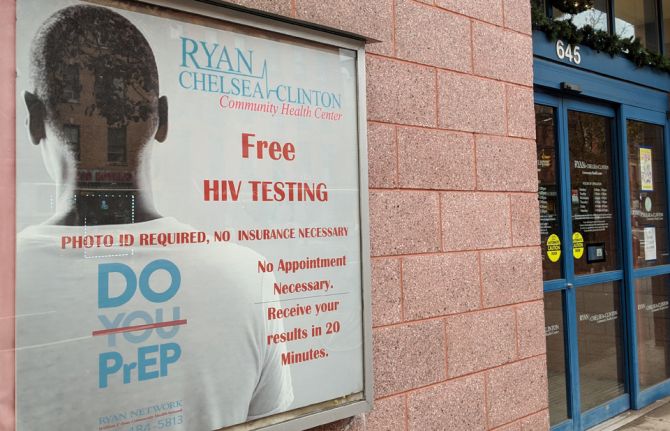
Press Statement
UNAIDS welcomes pledge by the President of the United States of America to stop HIV transmission in the country by 2030
06 February 2019 06 February 2019GENEVA, 6 February 2019—UNAIDS welcomes the pledge by the President of the United States of America to stop HIV transmission in the country by 2030. The President made the announcement during his State of the Union Address to Congress on 5 February 2019.
“The United States of America’s steadfast commitment to the HIV response and its support to UNAIDS’ call to end AIDS by 2030 have saved millions of lives,” said Michel Sidibé, Executive Director of UNAIDS. “I commend the President’s commitment to end AIDS in the United States, which will require a response grounded in human rights to reach all people living with and at risk of HIV, including the most marginalized.”
UNAIDS estimates that around 1.2 million people were living with HIV in the United States in 2015. The epidemic is largely concentrated in urban environments and disproportionally affects gay men and other men who have sex with men and African American, Hispanic and Latino women and men, as well as people who use drugs.
“The contribution by the United States to the global response to HIV, made through support for the President’s Emergency Plan for AIDS Relief, has made a tremendous impact,” said Mr Sidibé. “Globally, new HIV infections among children have been reduced by 35% since 2010 and 22 million people are accessing antiretroviral therapy, saving millions of lives.”
Through the President’s Emergency Plan for AIDS Relief, the United States has invested more than US$ 80 billion in the global response to HIV since 2003. “Strong, continued support for the global response from the United States is required given there is a US$ 5 billion shortfall from the US$ 26 billion required for an effective response to HIV in 2020,” said Mr Sidibé.
UNAIDS looks forward to seeing the details of the new United States strategy on HIV and to continuing to work closely with the United States to end AIDS, both in the country and around the world.
UNAIDS
The Joint United Nations Programme on HIV/AIDS (UNAIDS) leads and inspires the world to achieve its shared vision of zero new HIV infections, zero discrimination and zero AIDS-related deaths. UNAIDS unites the efforts of 11 UN organizations—UNHCR, UNICEF, WFP, UNDP, UNFPA, UNODC, UN Women, ILO, UNESCO, WHO and the World Bank—and works closely with global and national partners towards ending the AIDS epidemic by 2030 as part of the Sustainable Development Goals. Learn more at unaids.org and connect with us on Facebook, Twitter, Instagram and YouTube.
Contact
Sophie Barton-Knotttel. +41 22 791 1697/+4179 514 6896
bartonknotts@unaids.org
UNAIDS Media
tel. +41 22 791 42 37
communications@unaids.org
Press centre
Download the printable version (PDF)
Region/country

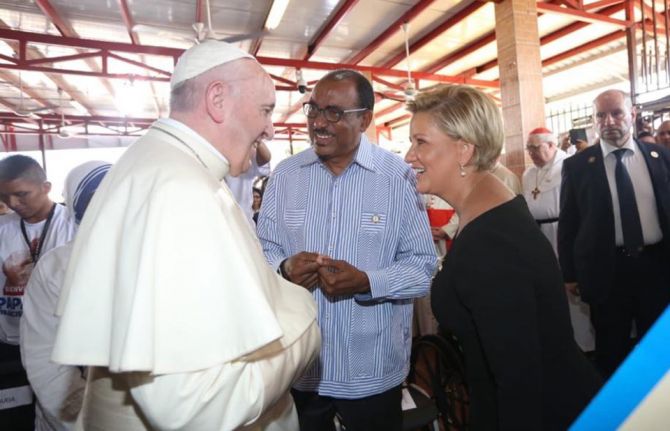
Press Statement
UNAIDS welcomes the call by Pope Francis not to discriminate
28 January 2019 28 January 2019PANAMA CITY/GENEVA, 28 January 2019—During a visit to the Good Samaritan Foundation and Home for people living with HIV in Panama, Pope Francis has urged people not to discriminate against their neighbours. The Good Samaritan Foundation and Home, or Casa Hogar El Buen Samaritano, is currently home to 16 people living with HIV aged from 16 to 60 years. They were among the first to be greeted by His Holiness during his visit.
“The Good Samaritan, whether in the parable or in all of your homes, shows us that our neighbour is first of all a person, someone with a real, particular face, not something to avoid or ignore, whatever his or her situation may be,” said Pope Francis.
Pope Francis travelled to Panama from 23 to 27 January to celebrate World Youth Day with young people from across the world. The visit to Casa Hogar El Buen Samaritano took place on the final day of his visit. His Holiness said that the work of the home confirms people’s faith by “anointing wounds, renewing hope and encouraging faith.”
For 15 years, Casa Hogar El Buen Samaritano has provided comprehensive care and treatment to help people living with HIV recover their health and dignity and reconnect with their communities and families. It also provides HIV prevention education for thousands of people, including young people in schools and young people who may be at risk of HIV.
The First Lady of Panama and UNAIDS Special Ambassador for AIDS in Latin America, Lorena Castillo de Varela, joined the visit, as did the Executive Director of UNAIDS, Michel Sidibé.
“Casa Hogar El Buen Samaritano embraces all people, regardless of their health or HIV status,” said Mr Sidibé. “Faith organizations like Buen Samaritano have an amazing ability to touch the lives of the people who are most difficult to reach and to remove the barriers of stigma and discrimination. Faith communities speaking out about HIV can move us closer to ending the AIDS epidemic,” he added.
UNAIDS works closely with the Catholic Church and the Holy See on shared goals, such as eliminating new HIV infections among children and increasing access to paediatric testing and treatment. Zero discrimination is key to achieving those goals.
Globally, significant gaps remain in preventing, diagnosing and treating HIV among children. In 2017, there were 180 000 new HIV infections among children globally. Just half (52%) of infants exposed to HIV worldwide received early infant diagnostic tests within the first two months of life and only 52% of children living with HIV had access to treatment in 2017.
The Vatican has convened a high-level discussion, Scaling Up Early Diagnosis and Treatment of Children and Adolescents, bringing together leaders of major pharmaceutical companies, multilateral organizations, donors and governments. While there is still ground to cover, there have been positive results in accelerating paediatric diagnosis and treatment. UNAIDS is continuing to work with all partners, including the Vatican, to scale up HIV services for children.
UNAIDS
The Joint United Nations Programme on HIV/AIDS (UNAIDS) leads and inspires the world to achieve its shared vision of zero new HIV infections, zero discrimination and zero AIDS-related deaths. UNAIDS unites the efforts of 11 UN organizations—UNHCR, UNICEF, WFP, UNDP, UNFPA, UNODC, UN Women, ILO, UNESCO, WHO and the World Bank—and works closely with global and national partners towards ending the AIDS epidemic by 2030 as part of the Sustainable Development Goals. Learn more at unaids.org and connect with us on Facebook, Twitter, Instagram and YouTube.
Contact
Sophie Barton-Knotttel. +41 22 791 1697
bartonknotts@unaids.org
UNAIDS Media
tel. +41 22 791 42 37
communications@unaids.org
Press centre
Download the printable version (PDF)
Region/country


Press Statement
UNAIDS welcomes appointment of Rico Gustav as Executive Director of GNP+
11 January 2019 11 January 2019GENEVA, 11 January 2019—UNAIDS warmly welcomes the appointment of Rico Gustav as the Executive Director of the Global Network of People Living with HIV (GNP+). GNP+ has been working for more than 30 years to ensure that the people most affected by HIV are heard and listened to as an integral part of the response to HIV. GNP+ is a much-valued partner of UNAIDS and its work is critical to ending AIDS.
“Rico Gustav is an excellent advocate for people living with and affected by HIV and a strong voice for all populations that have been marginalized,” said Michel Sidibé, Executive Director of UNAIDS. “He is a trusted activist, a skilled leader and a compassionate human being.”
Mr Gustav is a longstanding health and development activist and a leading voice in the community response to HIV. He is also a former staff member of UNAIDS, having worked for the UNAIDS Country Office in Indonesia and for the UNAIDS Regional Support Team for Asia and the Pacific in Bangkok, Thailand, building and strengthening links between community networks and regional stakeholders.
UNAIDS looks forward to working closely with Mr Gustav and GNP+ in advocating for, and supporting fair and equal access to, HIV prevention, treatment, care and support services for people living with and affected by HIV.
UNAIDS
The Joint United Nations Programme on HIV/AIDS (UNAIDS) leads and inspires the world to achieve its shared vision of zero new HIV infections, zero discrimination and zero AIDS-related deaths. UNAIDS unites the efforts of 11 UN organizations—UNHCR, UNICEF, WFP, UNDP, UNFPA, UNODC, UN Women, ILO, UNESCO, WHO and the World Bank—and works closely with global and national partners towards ending the AIDS epidemic by 2030 as part of the Sustainable Development Goals. Learn more at unaids.org and connect with us on Facebook, Twitter, Instagram and YouTube.
Related resources
Press centre
Download the printable version (PDF)
